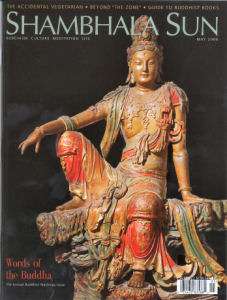SHAMBHALA SUN: A Buddhist Take on Life

This morning we officially welcome Shambhala Sun to the newsstand. This very attractive bimonthly is filled with articles explaining Buddhist practice and philosophy to a sophisticated Western readership.
Articles in the May issue, now in the MagSampler.com newsstand, cover subjects of interest both to practitioners of Buddhism and to readers who are interested in a different take on life. You'll find essays on a variety of Buddhist teachings, including the value of meditation, the art of awareness, the proper care of sacred objects from any religious tradition and vegetarianism.
I was surprised to learn that Buddhists are not necessarily vegetarians. Noa Jones writes wryly, "Even the highest Tibetan lamas are not above reproach. In his classic, Words of My Perfect Teacher, the great eighteenth-century Tibetan yogi and sage Patrul Rinpoche chastened carnivorous lamas who accept offerings of meat and devour 'piles of the still quivering ribs of yak until their mouths gleam with grease and their whiskers turn red.' He warns that they will be reborn in the ephemeral hells where they will have to pay back with their own bodies. Yet some of the most learned, authentic lamas I know eat meat."
Jones reports that some of her Buddhist friends argue that "it is better to eat little parts of big animals than lots of little animals." Their reasoning: a plate of shrimp requires a dozen lives, but the single life of a cow can satisfy dozens of diners.
I really liked a shimmering essay on the central Buddhist concept of emptiness by poet Norman Fischer, a Zen practitioner. To Buddhists, emptiness means that everything is transitory and without a solid identity or essence, that nothing is "real" in the usual sense. He explains, "We are, according to the emptiness pundits of Buddhism, deeply ignorant of the one thing we should not be ignorant of: the real nature of ourselves and the world we live in. 'Ignorance,' unfortunately, doesn't mean we don't know. It would be better if we didn't know. Ignorance means we know something very firmly, but it is the wrong thing: we know that things are solid and independent and intrinsically existent. But they actually are not. So ignorance is not not-knowing; ignorance is a form of knowing, but it is a mis-knowing. And spiritual practice is the process of coming to see our mis-knowledge and letting it go: to begin to experience, accept, and live the truth about how we and the world actually are. When we begin to understand and live in this way, there is a great decrease in the fear and dread, so common in human experience, caused by the huge gap between our expectations and the way things actually are. With an appreciation of the empty nature of things, there are no more foiled expectations. There is a lot more joy, peace, and love."
The ads in Shambhala Sun are also interesting. Most are for gatherings at retreat houses located across North America, some rather posh, and quite a few are for upscale items like art works, silk sleeping bags, large domed tents ("live in sacred geometry"), Japanese bedroom furniture ("harmony in the bedroom") and ergonomically designed meditation stools.
We've also received a supply of Shambhala Sun's sister publication, Buddhadharma. Subtitled "The Practitioner's Quarterly," it too contains a raft of well-crafted articles on Buddhist practice and philosophy. Both magazines are beautifully designed and are filled with colorful reproductions of traditional Buddhist art as well as imaginative contemporary illustrations. The magazines are published in Halifax, Nova Scotia.
An annual subscription to Shambhala Sun (six issues) is $28.00 from the publisher, although a postcard in the May issue offers a special deal: a two-year subscription for $28.00. An annual subscription to Buddhadharma (four issues) is $19.95 from the publisher. We'll send you a sample copy of either magazine for $2.59.


0 Comments:
Post a Comment
<< Home